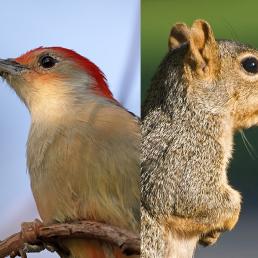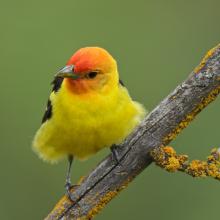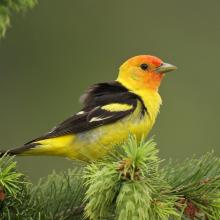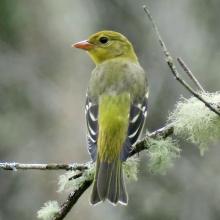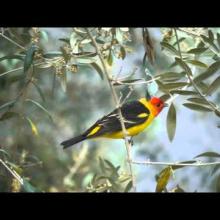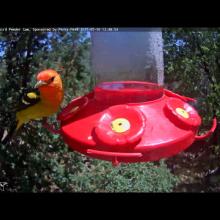

Join BirdNote tomorrow, November 30th!
Illustrator David Sibley and actor H. Jon Benjamin will face off in the bird illustration battle of the century during BirdNote's Year-end Celebration and Auction!
Poet Sean Hill performs three poems that encapsulate his dynamic relationship to birds, travel and life as a Black wanderer in the great outdoors. First is The Western Tanager or Why Montana, a villanelle reflecting on why people choose a home. Then, In Houston examines the intimacy of quiet moments and the surprising sounds that can be heard when we really listen. And finally, Silas Fishing 1967 shows how connecting with even small moments in nature can have a transformational effect.
BirdNote®
Sean Hill on Nature, Place, and Black Life
Written by Mark Bramhill
Mark Bramhill: This is BirdNote.
Poet Sean Hill has moved around many times in his life — between Georgia, California, Texas, Alaska, Minnesota, and now to Montana. While getting to know his new home in the Treasure State, Sean went up to Mount Helena for a hike…
Sean Hill: …when I saw the Western Tanager. It flew by. It was this beautiful flash. I was like, okay, that's a good omen, good auspice. I think I'm gonna be okay in this place.
Mark Bramhill: Around the same time, Sean went to a reading for a book about Rose Gordon, a Black woman born in Montana in the late 19th Century.
Sean Hill: There's a lot of Black folk who moved here, more than you might think, in the 19th Century. And raised families and stayed for generations. And this person in the audience was like, “why Montana? Why did these people come here?” So part of it's like, ‘why do people move places?’
[Lonesome, peaceful zither music]
The Western Tanager or Why Montana
Piranga ludoviciana
Are wanderings the same as migrations?
I came to Montana for love, which sometimes is
how we know our destinations.
The Western Tanager flies here for procreation
when the snow goes wet, puddles, runs, and takes to
far wandering. Is this the same as migration?
A life is the sum of grand and modest peregrinations.
Communities bloom at the meeting of opportunity
and ambition and can be a way to know our destinations.
A fire-engine red head cooling to orange to
a sunny yellow body with those charcoal wings,
the male western tanager flashes conflagration
or an eastern autumn, in flight. One, familiar, greeted
me shortly after we both arrived letting me know
our wanderings weren’t the same—his, a migration.
In a stand of ponderosas where a blanket of snow lay for decades
or longer, the dendrologist says these trees moved up from what’s
Mexico as that quiet water pulled back, a different migration
—moving seed by seed north generationally migrating
to where they had been and where they could live
never asking how do we know our destination?
Why Montana? One among my interrogations,
both public and private like How big is a home?
Are wanderings the same as migrations?
and How do I know my destinations?
Mark Bramhill: If you noticed a lot of repetition in this poem, that's because it's what's known as a villanelle. It's a poetic form, like a sonnet or a limerick — but rather than simply having a rhyme scheme, a villanelle also has two lines alternately repeated throughout the poem. In Why Montana, you have…
Sean Hill: Are our wanderings the same as migrations?
Mark Bramhill: …and…
Sean Hill: How we know our destinations.
Mark Bramhill: Some poets find this form especially tricky, but it's a form Sean frequently reaches for.
Sean Hill: The sort of recursiveness of the villanelle works for the way I sort of think and ruminate about things. Keep coming back to things. And I like the challenge of trying to work the refrains, in a different context to, sort of, whenever they return to make a turn happen.
Mark Bramhill: So, each time you hear an iteration of these repeated lines, the context and meaning is a little different, moving the poem forward. I highly recommend listening to the poem again and paying attention to the differences each repetition brings.
Alright, this next poem is about the unexpected sounds in quiet moments, from when Sean was living in Texas.
[Wistful alternative guitar music begins]
In Houston
Eating a ripe football-sized papaya (product of Mexico)
for breakfast while sitting on the back deck, I see three
ibises fly in a line over my house, low enough for me
to hear their wingbeats, sounding nowhere near as
desperate as sand sifting through the narrow neck
of an hourglass, but more like your hair sweeping
the pillow next to me in bed when I’m close enough
to see the palisade of pigment edging your lips
that borderline where dusk meets the pales keeping
out everything I can’t imagine beyond them when
I’m safe in the village. These white birds with black
wing tips that perhaps in some myth they dipped
in the inkiness of all terrestrial matters
before painting the night sky with their upstrokes.
I’m as amazed to hear these ibises (trailing legs
and leading with crescent beaks the same color
as this papaya) as I was to hear your hair
when I expected your heartbeat.
[Music begins to fade]
Mark Bramhill: Our last poem today is from Sean’s first book, Blood Ties & Brown Liquor. The book spans six familial generations of the fictional character Silas Wright, a Black man born in Milledgeville, Georgia in 1907. In this poem, Silas has a quiet, ordinary moment — seeing a Great Blue Heron while fishing — but it has a transformative effect.
[Slow, slightly brooding banjo music begins]
Silas Fishing 1967
That heron yonder’s
a good fisherman—
patient—will wade
and wait. But it ain’t
a good day for fishing—
neither of us having
no luck—just minnows
nibbling my bait.
There he goes—up and off
to another pond I suppose—
trailing those long legs, flapping
slow and steady. I cried and cried
the day Mama died. And it hurt
me deep when my wife…when
Devorah passed. But I didn’t
shed a tear. Been near ten years
and here they come
like the drops from
that heron’s feet.
Sean Hill: I was thinking about the etymology of grief and how grief is related to gravity. And there's this way in which the weight of the water dripping, those drops somehow allow for Silas’s grief to happen.
Mark Bramhill: You can find links to more of Sean Hill’s poetry — and more episodes with poetry about birds! — on our website, BirdNote.org. I'm Mark Bramhill.
[Music ends]
###
Senior Producer: John Kessler
Producer: Mark Bramhill
Managing Editor: Jazzi Johnson
Managing Producer: Conor Gearin
Content Director: Jonese Franklin
Bird sounds provided by The Macaulay Library of Natural Sounds at the Cornell Lab of Ornithology, Ithaca, New York. ML65634171 - Western Tanager recording by Jay McGowan. ML92488041 - Great Blue Heron recording by Paul Marvin. ML169297051 - Great Blue Heron recording by Bill Schmoker.
Music: Timid Strings by Blue Dot Sessions; Tremolomoln by Lymland; By the Bayou, at Dusk by Mark Bramhill and Sam Johnson.
BirdNote’s theme was composed and played by Nancy Rumbel and John Kessler.
© 2023 BirdNote April 2023
Narrator: Mark Bramhill
ID# hills-01-2023-04-26 hills-01
